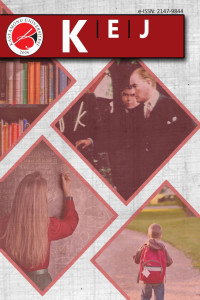The Effect of Technology Assisted Argumentation Based Teaching on Technological Pedagogical Content Knowledge Self Assessments of Preservice Teachers
Abstract
Purpose: This study investigates the effect of technology-supported argumentation-based teaching on pre-service teachers' Technological Pedagogical Content Knowledge (TPACK) self-assessment.
Design/Methodology/Approach: A quasi-experimental design with a pretest-posttest control group was used in the research. Participants of the study are 43 pre-service mathematics teachers who take the Analytic Geometry-I course. They were studying in the third grade in the faculty of education at a state university in Turkey in the fall semester of the 2019-2020 academic year. In the research process of the study, the subject of transformation geometry was taught to the experimental group using technology-supported argumentation-based teaching practice. The lessons are planned to last four weeks (12 lesson hours), three lessons per week. In the first week of the lessons, the translational transformation, reflection transformation in the second and third weeks, and rotational transformation in the fourth week were discussed. TPACK-SAS (self-assessment scale), which was used as a data collection tool in the study, was applied to both groups before the first week (pre-test) and after the last week (post-test).
Findings: The research findings observed that the participants' self-evaluations about TK (technology knowledge) were relatively low. In addition, it was observed that pre-service teachers' post-test mean scores regarding the sub-dimensions of PK (pedagogical knowledge), PCK (pedagogical content knowledge), and TPACK (Technological Pedagogical Content Knowledge), which mainly includes pedagogy knowledge, were high.
Highlights: As a result of the research, it was concluded that the technology-supported argumentation-based transformation geometry teaching practice did not affect the TPACK self-evaluation of the pre-service teachers in the experimental group. Studies similar to this with pre-service teachers can be carried out with students at different educational levels on transformation geometry or another mathematics subject.
The Effect of Technology Assisted Argumentation Based Teaching on Technological Pedagogical Content Knowledge Self Assessments of Preservice Teachers
Abstract
Purpose: This study investigates the effect of technology-supported argumentation-based teaching on pre-service teachers' Technological Pedagogical Content Knowledge (TPACK) self-assessment.
Design/Methodology/Approach: A quasi-experimental design with a pretest-posttest control group was used in the research. Participants of the study are 43 pre-service mathematics teachers who take the Analytic Geometry-I course. They were studying in the third grade in the faculty of education at a state university in Turkey in the fall semester of the 2019-2020 academic year. In the research process of the study, the subject of transformation geometry was taught to the experimental group using technology-supported argumentation-based teaching practice. The lessons are planned to last four weeks (12 lesson hours), three lessons per week. In the first week of the lessons, the translational transformation, reflection transformation in the second and third weeks, and rotational transformation in the fourth week were discussed. TPACK-SAS (self-assessment scale), which was used as a data collection tool in the study, was applied to both groups before the first week (pre-test) and after the last week (post-test).
Findings: The research findings observed that the participants' self-evaluations about TK (technology knowledge) were relatively low. In addition, it was observed that pre-service teachers' post-test mean scores regarding the sub-dimensions of PK (pedagogical knowledge), PCK (pedagogical content knowledge), and TPACK (Technological Pedagogical Content Knowledge), which mainly includes pedagogy knowledge, were high.
Highlights: As a result of the research, it was concluded that the technology-supported argumentation-based transformation geometry teaching practice did not affect the TPACK self-evaluation of the pre-service teachers in the experimental group. Studies similar to this with pre-service teachers can be carried out with students at different educational levels on transformation geometry or another mathematics subject.
Details
| Primary Language | English |
|---|---|
| Subjects | Studies on Education |
| Journal Section | Research Article |
| Authors | |
| Publication Date | January 31, 2023 |
| Acceptance Date | October 5, 2022 |
| Published in Issue | Year 2023 Volume: 31 Issue: 1 |


